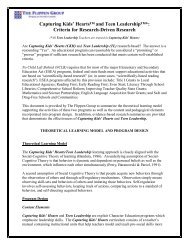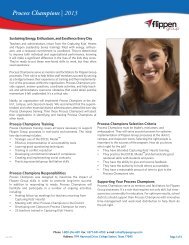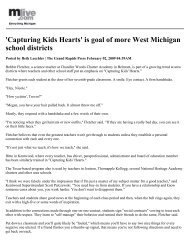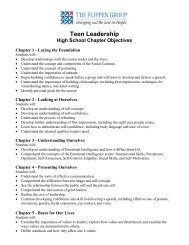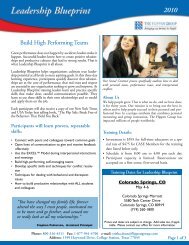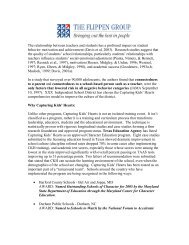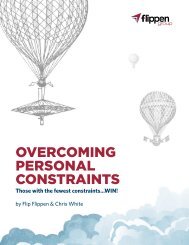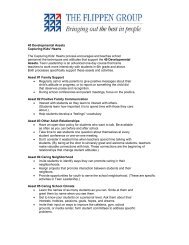Smart & Good High Schools - The Flippen Group
Smart & Good High Schools - The Flippen Group
Smart & Good High Schools - The Flippen Group
- No tags were found...
You also want an ePaper? Increase the reach of your titles
YUMPU automatically turns print PDFs into web optimized ePapers that Google loves.
CHAPTER 5: Fostering the 8 Strengths of Character—Outcome 7“When we began our discussions,” Mr. D. told us, “therewas unanimous agreement on several things.”We agreed that the school needed to work on all issues ofverbal intimidation and to raise awareness about issues ofhomosexuality and bisexuality so that students of either orientationdo not feel marginalized or isolated. However, therewas strong disagreement about the best way to achievethese goals. Some advocated a homosexual/bisexual supportgroup to address these issues, while others felt it was betterto address them through existing school structures such asdiscipline for verbal abuse, discussions led by the DiversityCommittee, and the use of the guidance system for support.“We began with unanimous agreementon the needs but strong disagreementabout how to achieve our goals.”<strong>The</strong> next step in the process was for each side to prepareand present a paper making its case. <strong>The</strong> paper in supportof a “gay/lesbian/bisexual awareness group” offeredthese reasons:1. A primary goal of the group, which would include bothhomosexual and heterosexual students, would be to createa more accepting and understanding school communityfor homosexuals and heterosexuals alike.2. Though some gay/lesbian/bisexual students do find studentsand faculty with whom they can speak, the existingsupport systems in the school do not guarantee that allsuch students will be able to identify and make contactwith those who are accustomed to dealing with theseissues and/or are sympathetic to the challenges these studentsface.3. Studies demonstrate the need to provide consistent supportto gay/lesbian/bisexual teens given that attemptedsuicide and suicide rates in these groups are higher thanthose of heterosexual teens.4. Greater education will help all students develop moresensitive awareness of sexual identity and related issues.5. Some heterosexual as well as homosexual students seethe challenges that gay/lesbian/bisexual students face asimportant civil rights issues to which they need to givetheir support.6. Denying gay/lesbian/bisexual students an equal opportunityto form an organization would constitute illegal discrimination.7. <strong>The</strong> group would be made up of both heterosexual andhomosexual students, many of whom would probablychoose not even to declare their sexuality. Understandingall these diverse voices would lead to a greater sense ofcommunity in the school.Each side in the controversy prepareda paper making its case.<strong>The</strong> paper opposed to forming the gay/lesbian/bisexualawareness group offered these reasons:1. Where gay/lesbian awareness or support groups havebeen established elsewhere, the issue of homosexualityhas been politicized to conform to a political correctnessthat has marginalized or even silenced religiously andmorally conservative voices. <strong>The</strong>re have been times whenconservative faculty have been labeled racist, sexist, orhomophobic because they did not subscribe to the properideological judgment on issues of race, gender, or sexualorientation. <strong>The</strong>se faculty were judged not on theiractions but for not having the correct beliefs.2. In the past, our school has discouraged the formation of“identity groups” in the belief that they tend to segregatepeople and hinder education that is best achievedthrough open dialogue among persons who hold differentviews.3. Gay/lesbian support groups can have unintended consequences,such as encouraging sexual experimentation. Forexample, research indicates that once an adolescent maleidentifies himself as gay, he is likely to initiate sexualactivity that involves life-threatening risks. Our schooldoes not distribute condoms because we believe thatmany students may interpret this as encouraging sex, andwe have had a strong policy of educating all students topractice abstinence in order to avoid the physical andpsychological dangers of sexual activity. We should notbe doing anything that might encourage sexual experimentation.4. Many studies have found a significantly higher risk ofattempted suicide among teens who identify themselvesas homosexual or bisexual. <strong>The</strong> risk of suicide decreases,however, for each year that an adolescent delays selfidentifyingas homosexual or bisexual. Moreover, manystudents who think they are gay as teens no longer do soas young adults. We should not encourage prematureclosure on this issue.5. A gay/lesbian support group also holds the danger ofcircumventing the role of parents in a young person’s190<strong>Smart</strong> & <strong>Good</strong> <strong>High</strong> <strong>Schools</strong>




